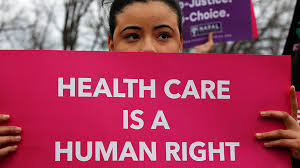
The Importance of Universal Healthcare
Universal healthcare, also known as public healthcare or national healthcare, is a system in which all residents of a country are provided with access to medical services and healthcare coverage. This approach to healthcare is based on the principle that quality healthcare is a fundamental human right and should be accessible to everyone, regardless of their income, social status, or employment.
One of the key benefits of universal healthcare is that it helps to ensure that no individual is left behind when it comes to receiving necessary medical treatment. By removing financial barriers to healthcare services, universal healthcare systems promote equality and social justice within a society.
Moreover, universal healthcare can lead to improved public health outcomes. When individuals have access to preventative care, early diagnosis, and timely treatment, the overall health of the population tends to improve. This can result in reduced mortality rates, lower rates of chronic diseases, and better management of public health crises.
Another advantage of universal healthcare is its potential to reduce overall healthcare costs. By providing comprehensive care to all residents and focusing on preventive measures, universal healthcare systems can help avoid costly emergency treatments and hospitalizations that often result from untreated conditions.
Furthermore, universal healthcare promotes economic stability by ensuring that individuals do not face financial ruin due to medical expenses. With access to affordable healthcare services, people are more likely to seek treatment when needed without fear of exorbitant bills or debt accumulation.
In conclusion, universal healthcare plays a crucial role in promoting social equity, improving public health outcomes, reducing overall healthcare costs, and safeguarding individuals from financial hardship. By prioritising the well-being of all members of society, universal healthcare systems contribute towards building healthier and more resilient communities.
Key Insights into the Benefits and Implementation of Universal Healthcare
- 1. Universal healthcare ensures that all citizens have access to essential medical services without financial barriers.
- 2. Proper funding and resources are crucial for the success of a universal healthcare system.
- 3. Preventive care and early intervention are key components of universal healthcare to promote overall population health.
- 4. Effective coordination between healthcare providers is essential to ensure seamless delivery of care in a universal healthcare system.
- 5. Public education and awareness campaigns can help promote understanding and support for universal healthcare among the population.
1. Universal healthcare ensures that all citizens have access to essential medical services without financial barriers.
Universal healthcare is a fundamental system that guarantees all citizens access to essential medical services without facing financial obstacles. By providing a safety net for healthcare needs, universal healthcare ensures that individuals can seek necessary medical treatment without the burden of high costs, thereby promoting equal access to quality care for everyone in society.
2. Proper funding and resources are crucial for the success of a universal healthcare system.
Proper funding and allocation of resources are paramount for the effectiveness and sustainability of a universal healthcare system. Adequate financial support ensures that essential medical services, facilities, and healthcare professionals are readily available to meet the diverse needs of the population. Without sufficient funding, the quality of care may be compromised, leading to long waiting times, limited treatment options, and overall dissatisfaction among patients. By investing in robust funding mechanisms and efficient resource management, a universal healthcare system can thrive and fulfil its mission of providing equitable and accessible healthcare for all.
3. Preventive care and early intervention are key components of universal healthcare to promote overall population health.
Preventive care and early intervention are essential pillars of universal healthcare systems, prioritising proactive measures to maintain and improve population health. By focusing on preventive strategies such as vaccinations, screenings, and lifestyle interventions, universal healthcare aims to detect health issues at their earliest stages and address them promptly. This approach not only enhances individual well-being but also contributes to the overall health of the community by reducing the burden of preventable diseases and promoting a culture of wellness and disease prevention.
4. Effective coordination between healthcare providers is essential to ensure seamless delivery of care in a universal healthcare system.
Effective coordination between healthcare providers is paramount to guaranteeing a smooth and uninterrupted delivery of care within a universal healthcare system. When healthcare professionals work together seamlessly, sharing information and collaborating on patient treatment plans, it enhances the quality of care provided to individuals. This coordination helps avoid duplication of services, reduces errors in treatment, and ensures that patients receive comprehensive and well-coordinated healthcare services across different medical settings. By fostering collaboration among healthcare providers, a universal healthcare system can optimise patient outcomes and improve overall efficiency in delivering essential medical care to all members of society.
5. Public education and awareness campaigns can help promote understanding and support for universal healthcare among the population.
Public education and awareness campaigns play a vital role in promoting understanding and garnering support for universal healthcare among the population. By disseminating accurate information about the benefits of universal healthcare, addressing common misconceptions, and highlighting real-life success stories, these campaigns can help individuals grasp the importance of equitable access to healthcare services for all. Through education initiatives, people can become advocates for inclusive healthcare systems, fostering a sense of solidarity and collective responsibility towards ensuring that everyone has the opportunity to lead a healthy life without financial barriers.





